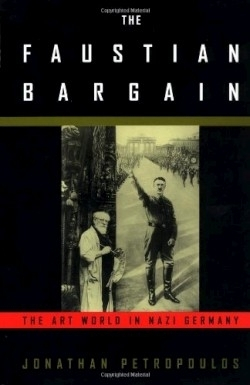The Faustian Bargain
The Art World in Nazi Germany
Tainted by the “blood and soil” nationalism which cakes the pathways toward the countless horrors of the Nazi regime, many of the German art world’s brightest minds were employed in the ruthless plundering of European art—seduced by promises of greatness reminiscent of Faust, in metaphorical proportion. The crushing weight oft mislaid morality is revealed in the bowed back of European culture, and the heaviness of culpability felt as a devilish hand laid across the nape of each Faustian neck.
The Faustian Bargain yields an unflinching look at those who wielded their knowledge and expertise of the arts to assist in plundering millions of works estimated to have been removed or destroyed from both the collections of Jewish families and public museums of Europe. In efforts to “purify” culture, finance the political machine of the Third Reich or inflate personal collections of Nazi officers, former independent members of the contemporary art community symbiotically melded with the Nazi regime.
Petropoulos, the Reseach Director for the Presidential Advisory Committee on Holocaust Assets, divides his study neatly between five strata of the art world-the museum directors, art dealers, critics, historians and artisans. His unforced, lucent narrative style fuels the reader onward with the nightmarish sensation of rancid history unfurling, unveiling a mounting cast of characters and effectively allowing a chilling network of baneful accomplices to emerge. More than twenty-five individuals are explored as the oft forgotten underpinnings of this diabolical assault on the humanities. These ordinary people, all of whom bargained for the skewed realization of career goals, enjoyed the dizzying ascension to the ranks of Nazi elite as many became personal acquaintances of Hitler himself. Petropoulos introduces Ernst Buchner for example, a distinguished museum director enticed by Hitler’s promise of a massive museum to be built in Linz. Buchner, who “became increasingly immoral with increasing proximity to those with power,” was integral in “repatriating” artwork, organizing the “Aryanization” of Jewish art dealerships, and spearheading art plundering campaigns.
After documenting the abhorrent acts of each figure, Petropoulos details their post-war lives; revealing the disturbingly high incidence of acquittals at the denazification trials, and noting the success of the exonerated in reviving their former careers. Though these crimes went largely unpunished, Petropoulos urges through his efforts in The Faustian Bargain, that the passing of time should not similarly erase their guilt.
Reviewed by
Karen Wyckoff
Disclosure: This article is not an endorsement, but a review. The publisher of this book provided free copies of the book to have their book reviewed by a professional reviewer. No fee was paid by the publisher for this review. Foreword Reviews only recommends books that we love. Foreword Magazine, Inc. is disclosing this in accordance with the Federal Trade Commission’s 16 CFR, Part 255.

